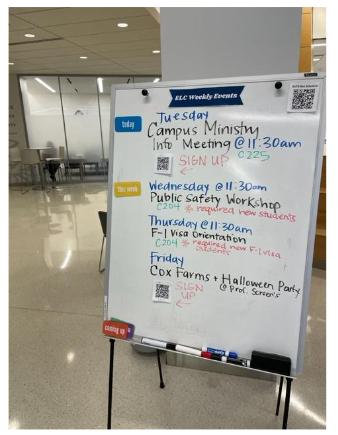In her book, “Coaching with Careers and AI in Mind: Grounding a Hopeful and Resourceful Fit for a Digital World,” Adina Terry offers much needed insights about how to prepare job seekers for success in the turbulent digital age. Some, like the World Economic Forum, refer to our current epoch as the Fourth Industrial Revolution characterized by the advance of cyber-physical systems and artificial intelligence. In so many ways, the world of work has dramatically changed and preparation for these economic realities require a reimagining about how to provide career counseling.
This week’s post offers insights about career counseling in this digital age from the tradition of Ignatian discernment. Image from “Four Strategies for Discernment” by Vinita Hampton Wright at IgnatianSpirituality.com.
The career counseling literature stresses the need for flexibility, adaptability, and lifelong learning in navigating the demands of work at a time of digital innovation and disruption. Much of what job seekers need is related to the development of technical skills and expertise necessary to fulfill the ever-changing demands of jobs that meet current economic and social needs. But more than technical practices, interior dispositions and capacities to tap into one’s deeper sense of meaning and purpose are necessary to align one’s skills to available work opportunities. In this way, career support needs to be about the “Whole Person,” a values-based commitment made explicit in the Spirit of Georgetown.
Thankfully, SCS offers a set of resources to support students on their professional journeys, including career coaching from a certified career counselor. These curated resources are in addition to program-specific professional preparation and advising that take place within classes and in applied networking opportunities that occur outside of the curriculum. I believe that spiritual accompaniment resources should also be considered part of the overall well of support for career development. Students should consider their pastoral engagements with the suite of Georgetown’s multi-faith chaplains and staff, which occur in individual consultations and group settings like workshops, fellowship, and retreats, an important part of their career preparation.
Engagements with spiritual guides can help students discern their “calling,” which scholars in an article in the journal The Counseling Psychologist entitled, “Purpose and Meaning in Career Development Applications,” describe as “linking what clients do at work to a broader impact” that “can enhance a sense that they are living out a calling and promotes purpose and meaning in their careers.” The key to this understanding of “calling” is that individual flourishing does not take place in isolation but depends on connecting one’s own well-being to the well-being of the entire community. Calling is truly a shared project. Calling is not discovered in a single “aha moment,” but discerned over the longer term. How, you might be asking, can one’s calling in work be discerned over the longer term of a career that needs to withstand the dynamic forces of an economic system in flux?
Discernment is one of the essential practices at the root of the Jesuit tradition of spirituality and leadership. This approach necessitates that the seeker regularly grows in sensory awareness of their inner movements. These habits of self-awareness, cultivated through the Ignatian examen of consciousness, lead the individual to notice their emotions, feelings, affections, desires, attractions, and repulsions. The reflective stage of the examen invites the seeker to make meaning of these inner experiences. Am I being inclined by my inner movements to experience more connection and alignment with my true self and my authentic identity before my ultimate source of meaning (e.g., God, Ultimate Mystery, etc.)? Or am I noticing a troublesome disconnect between what I deeply desire for myself and how I actually feel? This journey of discernment requires regular attention to these subtle interior changes and this process should be supported by a trained spiritual guide.
William Spohn, in his article “The Chosen Path” in America Magazine, presents the transformative possibilities of utilizing an Ignatian framework in making career decisions. Spohn names this potential for transformation through Ignatian spirituality as the opportunity to “discover our personal calling by aligning our gifts and aspirations with what we see as the deepest needs of our world.” We must remember that discerning one’s vocation is a continuous exercise and it is not generic, but a unique journey experienced as a “call to individuals tailored both to their talents and the community’s needs.” By bringing one’s deeper desires into the career discernment process, the individual taps into possibilities for self-growth and community service that extend beyond their technical skills and training. I hope that all involved in the career support ecosystem consider the multidimensional and holistic dimensions of assisting students on the journey to meaningful work.

